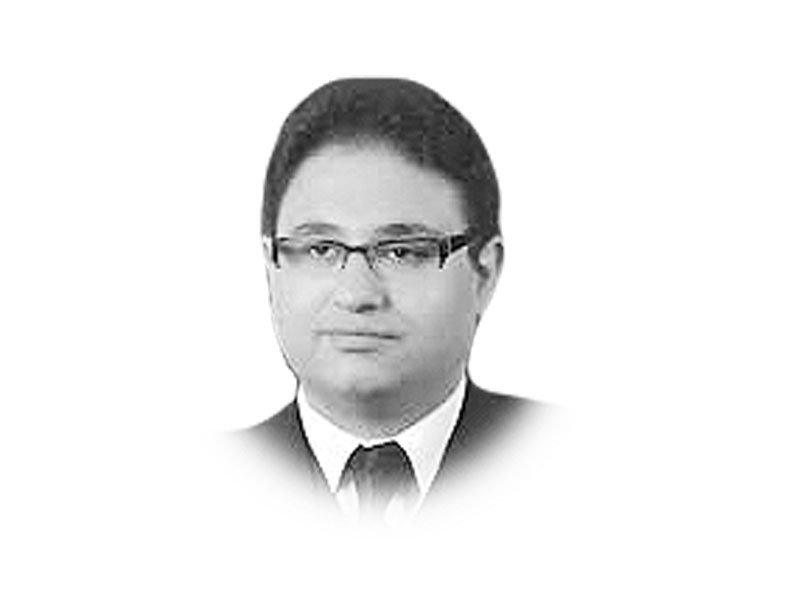
Right from the moment the prime minister started taking preparatory drugs for his major surgery in London, clouds of uncertainty started hovering around the country as to who would hold the reins of power during the time he remained unconscious. Though, unofficially, an attempt was purportedly made by the prime minister to devolve day-to-day responsibilities of the government upon his trusted finance minister but legally speaking, this entire exercise seems to be a mere facade and a sheer nullity in the eyes of the law as the Constitution does not enunciate any mechanism for nomination of an acting head of government should the incumbent fall ill or otherwise is unable to perform his functions.
Some vociferous PML-N stalwarts are justifying the prime minister’s insistence on clinging to office despite temporary incapacity on the pretext that he can legally run the affairs of government through his ministers without there being any need for him to be physically present in Pakistan. One such clause that is vehemently being relied upon is Article 90, which stipulates that in the performance of his functions under the Constitution, the prime minister may act either directly or through federal ministers. This enunciation is made in the context of distribution of government functions and its division into various ministries. The assumption of existence of power in the hands of the prime minister simply to delegate his functions to a defacto acting prime minister on the basis of Article 90 (2) is preposterous. Firstly, because as in the case of the president, governors, chief justice of Pakistan, provincial high courts and the Federal Shariat Court, Articles 49 (2), 104, 180, 196 and 203 C (8) expressly provide for the appointment of acting president, governor and chief justices in case the incumbent is out of the country or otherwise unable to perform official functions. If the framers of our Constitution actually contemplated the appointment of an acting prime minister, it would have been expressly provided for like in the case of other constitutional offices. As a matter of fact, the Constitution in its original form (Article 95, as it was prior to March 2, 1985) did enunciate a mechanism whereby in the event of the prime minister’s absence from the country, the senior most federal minister could automatically start performing functions of the prime minister till the incumbent returned to Pakistan. This provision was, however, amended and the constitutional scheme for the appointment of an acting prime minister was scrapped.
Though the question of appointment of an acting prime minister or delegation of powers of the head of the government unto a federal minister never directly came before the courts, the Supreme Court, nevertheless, in the Ashraf Tiwana Case (2013 SCMR 1159), held that discretionary authorisation conferred on a person or body by statute could not be delegated. All statutory authority is fiduciary in nature; it is vested in the functionary or body specified in that statute and is therefore, as a rule, non-delegable. In view of the wisdom derived from this principle set out by the apex Court, all actions carried out by Ishaq Dar, purportedly under the garb of delegated authority from the prime minister, are likely to be struck down as being unconstitutional and ultra vires.
More surprisingly, even in cases where the law does expressly endow upon the prime minister the authority to delegate certain powers, particularly those pertaining to national security, Nawaz Sharif did not exercise the same and instead went under anaesthesia with the reins of the country’s strategic weapons tightly held in his hands. The deployment and operational command and control of Pakistan’s strategic nuclear arsenal is overseen by the National Command Authority, which has the prime minister as its chairman. Section 4 of the National Command Authority Act of 2010 clearly envisages delegation of the power of chairman from the prime minister to the Chairman Joint Chiefs of Staff Committee (CJCSC) in circumstances that we are facing today. Unfortunately, the prime minister did not delegate this pivotal responsibility upon the CJCSC before being sedated. With this omission, I guess the situation no more remains one of mere constitutional conundrum; rather it pertains to our national security and strategic defence. Keeping the precarious security situation in the region, particularly in the aftermath of the recent drone attack, in mind, if a need arises to take a decision qua strategic weapons, will the prime minister be up to the task or will the finance minister chair the meetings of the National Command Authority also?
While I have full sympathy with the person of Nawaz Sharif and fervently hope that he recovers steadily, the state and the affairs of government nevertheless transcend beyond individuals. It is imperative that the present Constitution be immediately amended so as to revive Article 95 in its original form and provide for the appointment of acting prime minister as is done in the case of other high constitutional offices, failing which the ship of the Pakistani government will continue to wander aimlessly without its captain if such a situation arises again.
Published in The Express Tribune, June 4th, 2016.
Like Opinion & Editorial on Facebook, follow @ETOpEd on Twitter to receive all updates on all our daily pieces.













COMMENTS (15)
Comments are moderated and generally will be posted if they are on-topic and not abusive.
For more information, please see our Comments FAQ